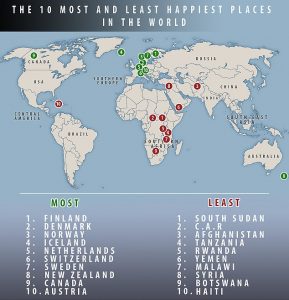
I used to think happiness was genetic, that happy people were born that way. That’s only half-true; some research suggests that 50% is determined by heredity. What about the other half? About 10% comes from living conditions. The remaining 40% depends on YOU.
Happiness Defined
Happiness is not just the absence of sadness. It’s related to optimism, hope, pleasure, and joy, but it’s not interchangeable with any of them. It’s difficult to quantify, to measure, and to track. And it’s something that most people say they want. Even the U.S. Declaration of Independence included the pursuit of happiness as an inalienable right.

The World Happiness Report, which ranks countries by how happy its citizens perceive themselves to be, provides a series of social snapshots over time. Finland retained its number one spot, while the U.S. dropped to No. 19, its worst ranking ever. Maybe we need a revival of happiness?
Positive psychology researchers often refer to happiness as subjective well-being. That means it’s an emotional feeling of satisfaction and fulfillment. Sonja Lyubomirsky, in The How of Happiness, defines it as “the experience of joy, contentment, or positive well-being, combined with a sense that one’s life is good, meaningful, and worthwhile.” The first part of her definition describes an emotional feeling of satisfaction. The second part addresses fulfillment.
Happiness is the experience of joy, contentment, or positive well-being, combined with a sense that one’s life is good, meaningful, and worthwhile.
Sonja Lyubomirsky
Happiness comes from inside you. You may feel positive emotions from your dog. Or from traveling across the planet. Or from sandy beaches. But if you rely on external stimuli to be happy, it will be challenging at best to maintain your well-being.
Keys to happiness
In a blog post earlier this year, I mentioned a Coursera course I had taken on the Science of Well-Being. Professor Laurie Santos developed it after studying the science, data and psychology on happiness. It became the most popular course offered at Yale, and with the online program, reached over 400,000 people.
Santos provides insights from empirical data. She states that our minds can lie to us about what will make us happy. We may think it will come from buying that house, getting that promotion, or making more money. Those may cause a bump in positive feelings, but it’s temporary. And if you don’t get that house, promotion, or money, do you become substantially less happy? Again, it’s temporary.
We have to stop focusing on the things that don’t matter, and focus on the things that do. In a CBS interview, Santos listed the following keys to happiness.
- Kindness – volunteer, help others, give people the benefit of the doubt
- Meditation – improve your ability to regulate your emotions
- Gratitude – count your blessings, say thank you to others
- Exercise – releases “feel good” endorphins that are beneficial for body and brain
- Sleep – can reduce repetitive negative thoughts
Happiness takes work. It’s an ongoing process, rather than an end-goal. You have to retrain your brain to react differently to external stimuli. You have to learn to better cope with negative impacts on your life, and to savor those that are positive.
Tools to get Started
The Science of Well-Being is an online Coursera course offered by Yale. It’s a multi-week journey to build more productive habits toward happiness.
The Happiness Lab is a podcast that Professor Santos launched last week to provide ongoing motivation
Greater Good Magazine from the Greater Good Science Center at UC Berkley has articles, videos and podcasts about happiness and related well-being topics.
Authentic Happiness, a University of Pennsylvania website, provides free resources to help people learn about positive psychology.
Take a Step to Be Happy

Now it’s up to you. Review the tools above and make the commitment to try something. A small step is better than no step at all, and over time it may lead to big things. Be happy!
